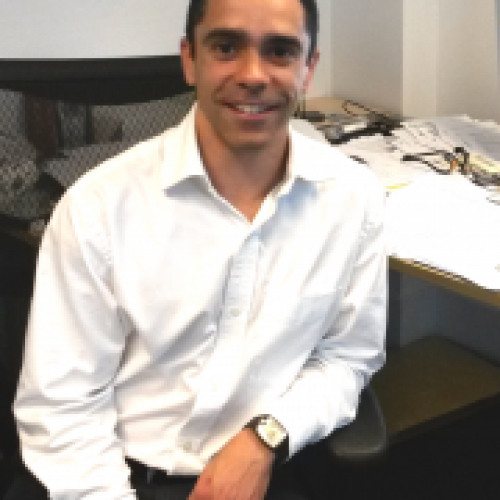
Dr Eduardo López
Eduardo López is a Senior Research Fellow in Complexity Science and based is at the CABDyN Centre at Saïd Business School. He is also a Research Fellow at Green Templeton College, and a Stipendiary Lecturer in Physics at Pembroke College.
Teaching activities
As a lecturer at Pembroke College, I have been recently teaching second year physics courses including Electromagnetism, Quantum Mechanics, and Statistical and Thermal Physics. Over my professional career, I have taught numerous courses in physics including Condensed Matter and Solid State Physics, Classical Mechanics, laboratory techniques and a number of introductory university physics courses for non-physicists. While completing my studies, I also held positions at the secondary school level teaching physics and maths.
From 2005–08, Eduardo was a postdoctoral fellow in the Center for Nonlinear Studies in the Theoretical Division of Los Alamos National Laboratory. He obtained his PhD in Theoretical Physics at Boston University in H Eugene Stanley's group. He also has a Master of Arts in Physics from Boston University and a degree in Physics from the Universidad del Zulia, Maracaibo, Venezuela.
Research Interests:
I have a general interest in Complex Networks, with a particular focus on transport processes – some of the most fundamental and important processes taking place in complex/random structures. My work addresses the question of the origin of such structures and their overall performance, as well as their relationship to transport processes. The presence of disorder in networks has been an important component of my work, and I have been able to identify general features that disorder induces in contexts as varied as low temperature material samples and epidemic propagation.
Percolation problems are another major theme of my work. I have carried out research on flow on percolation clusters close to criticality, the connection between this flow and more general forms of disorder in a network, and also introduced a new model in which percolation is redefined to take into account performance/efficiency features of a system, in an effort to create more realistic accounts of real-world problems subject to localised interruptions/failures. This last model, called Limited Path Percolation, bridges the gap between the pure condensed matter physics percolation problem, and problems in epidemics, communication and transportation, where long or expensive paths are almost never used. In standard percolation models these paths are incorrectly included among the set of possible paths.
Currently, a large portion of my work focuses on questions that take me to the realm of applied mathematics such as flow of workers through the firms of an economy (http://oguerr.com/laborsim/), the propagation of infectious diseases, and the patterns of social interaction between individuals.
Dr Eduardo López

Eduardo López is a Senior Research Fellow in Complexity Science and based is at the CABDyN Centre at Saïd Business School. He is also a Research Fellow at Green Templeton College, and a Stipendiary Lecturer in Physics at Pembroke College.
Teaching activities
As a lecturer at Pembroke College, I have been recently teaching second year physics courses including Electromagnetism, Quantum Mechanics, and Statistical and Thermal Physics. Over my professional career, I have taught numerous courses in physics including Condensed Matter and Solid State Physics, Classical Mechanics, laboratory techniques and a number of introductory university physics courses for non-physicists. While completing my studies, I also held positions at the secondary school level teaching physics and maths.
From 2005–08, Eduardo was a postdoctoral fellow in the Center for Nonlinear Studies in the Theoretical Division of Los Alamos National Laboratory. He obtained his PhD in Theoretical Physics at Boston University in H Eugene Stanley's group. He also has a Master of Arts in Physics from Boston University and a degree in Physics from the Universidad del Zulia, Maracaibo, Venezuela.
Research Interests:
I have a general interest in Complex Networks, with a particular focus on transport processes – some of the most fundamental and important processes taking place in complex/random structures. My work addresses the question of the origin of such structures and their overall performance, as well as their relationship to transport processes. The presence of disorder in networks has been an important component of my work, and I have been able to identify general features that disorder induces in contexts as varied as low temperature material samples and epidemic propagation.
Percolation problems are another major theme of my work. I have carried out research on flow on percolation clusters close to criticality, the connection between this flow and more general forms of disorder in a network, and also introduced a new model in which percolation is redefined to take into account performance/efficiency features of a system, in an effort to create more realistic accounts of real-world problems subject to localised interruptions/failures. This last model, called Limited Path Percolation, bridges the gap between the pure condensed matter physics percolation problem, and problems in epidemics, communication and transportation, where long or expensive paths are almost never used. In standard percolation models these paths are incorrectly included among the set of possible paths.
Currently, a large portion of my work focuses on questions that take me to the realm of applied mathematics such as flow of workers through the firms of an economy (http://oguerr.com/laborsim/), the propagation of infectious diseases, and the patterns of social interaction between individuals.